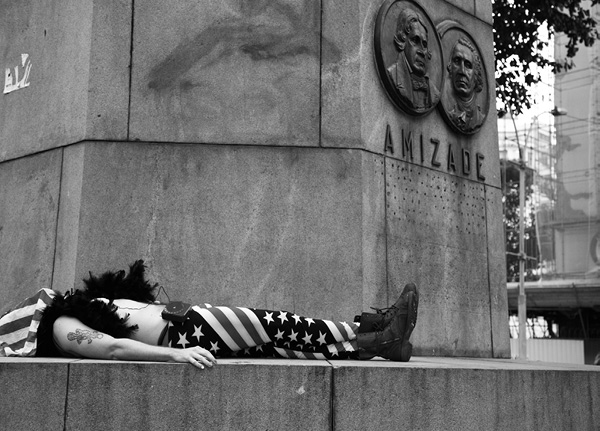
INGLÊS PARA REVOLUCIONÁRIXS LATINO-AMERICANXS (ENGLISH FOR LATIN AMERICAN REVOLUTIONARIES)
first performed on June 14, 2016
Praça Quatro de Julho, Rio de Janeiro, Brazil
performed twice in 2016
RAPHI SOIFER
Rio de Janeiro, Brazil
346629258r346629258a346629258p346629258h346629258i346629258p346629258e346629258r346629258f346629258o346629258r346629258m346629258a346629258n346629258c346629258e346629258@346629258g346629258m346629258a346629258i346629258l346629258.346629258c346629258o346629258m
INGLÊS PARA REVOLUCIONÁRIXS LATINO-AMERICANXS (ENGLISH FOR LATIN AMERICAN REVOLUTIONARIES)
RAPHI SOIFER
“Inglês para revolucionárixs latino-americanxs” (“English for Latin American Revolutionaries”) is a series of public solo performances utilizing text, movement, and junk food to explore the complexities of memory, translation, and national and individual identity. Performances take place in a public square in downtown Rio de Janeiro, Brazil, with the United States Consulate building serving as both a backdrop and a focal point.
I performed the first installment, “Flag Day,” on June 14, 2016. It was a kind of retrospective of the waning days of the Obama administration, and of both the seduction and the tremendous violence implicit in the way that the ‘American Dream’ manifests itself throughout the world, especially in Latin America. Dressed in American flag leggings, a padded gold bra, and a feather boa, I washed a stained American flag in a bucket of soapy water. I also wandered the plaza in front of the consulate, offering brownies to onlookers and passers-by, and carrying out a series of spoken word performances in both Portuguese and English, ranging from personal anecdotes (including my grandmother’s cherished brownie recipe) to reflections on US power and the preamble to AI-5 (Brazil’s 1968 declaration of martial law under a US-supported military junta).
The second installment, “Uma ação sem graça” (“A Graceless/Unfunny Action”), took place on November 25: Black Friday. This performance was an ‘anti-celebration’ of Thanksgiving, a response to the belligerent excesses of consumption at the heart of American ideal of manifest destiny. With occasional passers-by and a small invited audience watching, I set a table with American flags and gorged myself on pumpkin pie and on brand-name American snacks (Doritos, Budweiser, Snickers bars, and Coca-Cola). As I ate, I extolled US military victories and cultural expansion (in Portuguese), and prayerfully sang American TV jingles (in English).
During the second performance, in sharp contrast to the first, I didn’t offer to share any food with the public: this time, only I could taste the tantalizing flavors of the American Dream. Taken as a sequence, the performances could be seen as a procession from the cautious optimism of the Obama years to the fear and rage that fuel the Trump presidency (and that it, in turn, produces). But in a more general sense, both performances point to a contrast between sweetness and violence—and between inclusivity and erasure—that is inseparable from the way United States celebrates itself.